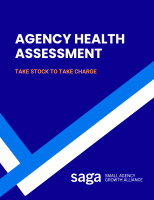Account Managers and Account Executives play a vital role in any agency, but especially in small PR and marketing agencies.
You are often the day-to-day connection between the agency and its clients, responsible for facilitating the communication between everyone involved.
You likely fill the role of project manager to make sure that daily, weekly, and monthly tasks get completed correctly and on-time.
You play an important part in making sure that the client sees the results that they expect while also ensuring that the agency turns a fair profit.
Opportunity comes with responsibility
In a small agency, you have more opportunities, but also more responsibility than your counterparts in the larger shops.
You have more frequent direct access to clients and your agency’s owner.
There is less bureaucracy to check up on you and your work and provide obstacles to creative thinking.
But you also need to be more of a jack-of-all-trades. Chances are you don’t have separate departments that provide you with direct support on your client work.
You may be using more outside contractors and fewer in-house resources. That often puts you in the position of directly managing those contractors just as you might another employee.
Seeing the big picture
You will find yourself more successful in your job if you understand more about the business and how it works.
Agencies make money by selling the time of its team (including you) at a higher price than it costs to complete the work.
Whether your agency charges clients by the hour, per project, or in some other fashion, it is imperative to accurately predict how much it will cost to complete a certain piece of work – and then charge the client appropriately.
Of course, the actual cost of employees or contractors is higher than it looks on paper.
If your salary is $40,000 per year, then your true cost to the agency is likely to be more in the range of $50,000 to $60,000 once you factor in benefits, taxes, and overhead expenses associated with employing an individual.
As a general rule of thumb, an agency needs to be able to bill out an employee to clients for at least twice their annual salary in order to avoid losing money. So if you are a $40,000 per year employee, then you need to be getting charged to one or more clients at a rate of no less than $6,500 per month – and really closer to $10,000 if you want to have a thriving business that grows.
The more team members and the more other expenses (media databases, software subscriptions, third party vendors, etc.) that it takes to complete a project, the more the client needs to be charged.
The importance of managing scope
While your agency owner has expectations that need to be met in order to meet financial goals, you also have client expectations that you need to manage.
As a daily client contact and project manager, one of the most important roles you play is to make certain that the work your agency is doing remains “within scope.”
But what exactly does that mean?
When the client hires your agency, they do so with certain expectations about what work will be done and what it will cost.
Typically, this will be put in writing in the form of a Statement of Work or some other similar document. It might be a simple email or it could be part of a formal contract.
However it is spelled out, it is important for the agency to accomplish what it promises, but just as important not to do work outside of those boundaries without charging more.
As an account manager or executive, there is a strong instinct to fulfill whatever request a client might make. After all, you’re talking with them every day and you (and your boss) want them to be happy.
But you need to make sure that you understand what your agency has promised and flag for your bosses any time that you are asked to do work that is outside of that scope.
They might decide to do the work anyway, but it needs to be an intentional decision so that you don’t find yourself doing a lot more work for no more money. That’s how agencies end up losing money on client work and that’s not good for anyone involved.
Tracking costs
Your agency is – or at least should be – carefully tracking what it costs to perform work for specific clients and projects.
Every project should have a budget based on initial estimates of the time and other expenses it will take to complete it successfully.
Then it is imperative to measure the actual inputs to compare to those estimates so that your agency can understand how profitable a piece of work was so that future estimates and pricing can be adjusted to make sure that the value works for everyone.
That likely means some form of time tracking – something that nobody likes to talk about and even fewer people enjoy doing.
But understanding how much time that you and your coworkers spend on a certain client project is essential to pricing properly in the future.
As important, time tracking helps your owner know when it is time to hire more help for you so that you aren’t overwhelmed. It might also identify opportunities to cut back on certain types of work to relieve the burden you face.
If you are managing a project, you need to understand the expectations of the client, the cost estimates used to develop the price, and the actual expenses incurred along the way.
Communicating with clients
There’s a good chance that you provide the impression of your agency that your client sees every day.
Whether it is email, Zoom, text, phone, or in person, you are representing your agency to the client.
That means you need to be conscious about every aspect of how you communicate – both verbally and non-verbally.
With more of us working remotely some or all of the time, that means thinking about our backgrounds and attire to understand how a client might perceive it.
It means that we need to choose our words carefully, especially when we might be annoyed by the client or even a co-worker.
Effective communication also means carefully tracking what you promise. If you agree to something on Zoom or the phone, it is often a good idea to confirm that in an email to make sure there was no misunderstanding.
You also need to capture these conversations in whatever internal project management or tracking tool your agency might have so that others can access it if needed.
When you are communicating with clients you also need to understand that while you want to keep them happy you also have a responsibility to your employer to carry out their expectations.
It is sometimes easy to forget that while we are serving the client we are not their employee so there are boundaries that we need to maintain and an image we need to represent.
Managing projects and deadlines
If you are managing a project for a client, you need to be clear about the expectations, not just for the work product but especially for the timeline that has been agreed.
As you perform the same type of work more regularly, you will gain a better understanding for how long things will take and what potential obstacles may lie in the way.
One of the things that is often overlooked when putting together project plans is the amount of time it will take for clients to provide feedback and approvals at various stages.
Make certain that you are working with your colleagues to build in cushions to project timelines wherever possible and avoid being overly optimistic, especially when it comes to how fast a client will get back to you about something that you request. It almost always takes longer than you think it should.
When you have project deadlines, it is critical that you make your managers aware of any potential threats to the schedule as soon as you see them.
The sooner that you and your team spot a problem, the more likely you are to be able to find a solution or manage client expectations to get in a better position.
Avoid surprises
My number one rule for employees over the years has always been, “Don’t surprise me.”
That is true of both good and bad surprises.
In particular, I never wanted to hear something from a client first that I could have heard from one of my team earlier.
Don’t be tempted to think that if something goes awry with a client that you can find a way to fix things before your boss finds out. You might, but the odds aren’t good that they don’t end up discovering what happened.
At the same time, if you have a big win for a client, make sure that your boss knows. It’s not tooting your own horn, it is all about ensuring that they look smart if a client brings it up to them in conversation.
Always be learning
We all have a lot to learn professionally, but when you are at an earlier stage in your career there are even more opportunities to grow.
Be curious and try to understand more about your agency and how it works. Get to know your clients and their industries. Dig deeper on the tactics that your agency uses to understand why they use them and how they work.
Adopt a willingness to try new things and say “yes” when your boss asks you to do something. You may be surprised at what you end up enjoying and how it may impact your future career path.
Ask your employer for opportunities to learn more, especially in areas where you believe you should be stronger. That’s not a sign of weakness, but a great sign of self-awareness that good bosses appreciate.
When you have an opportunity to sit down with your manager for review and feedback sessions, be sure to ask them where you can improve so that you can focus your professional development appropriately. Be clear with them about how you learn best and come up with a plan to get the knowledge you need.
Insist on a weekly 1:1 with your manager
Nothing will help you to be a better employee who produces better results for clients and has a better career path than having a weekly meeting with your manager.
A good 1:1 meeting relies on the employee to be the one driving the conversation while the manager spends more time listening and answering questions.
That means that you need to take the time to develop your own agenda for those conversations.
Yes, you need to keep your manager updated on the status of projects, but try to use your 1:1 to zero in on specific things that your manager can help you with.
If a client is dragging their feet or you need something from a co-worker, let your manager know. They may be able to find a way to get things unstuck.
If your manager is the obstacle because they aren’t giving timely approvals or providing the resources or tools you need to be successful on a project, be sure to let them know that, too.
Make sure that your manager knows where you are having success, too, and the type of projects or work that you have really enjoyed doing. That can often open doors to new opportunities down the road.
Finally, take the feedback that your manager gives you without argument. Even if you think that they are not correct about something, it is often better to take the feedback and digest it a bit before pushing back. There is often a kernel of truth to each concern that they raise.
That doesn’t mean that you shouldn’t do your best to make sure that your manager has the correct facts. If they have a concern or a criticism based on inaccurate information, feel free to share the correct information, but the more defensive that you appear the less likely the conversation is to be fruitful for either party.
Getting what you deserve
There will likely come a time when you feel that you deserve to get a raise, and you will wonder how to bring it up with your manager.
First, you need to understand what the compensation process is like at your agency. In many cases, it is very informal, while other agencies have adopted a set schedule for bonuses and compensation reviews.
If there is a process, you ought to abide by it unless there are truly extenuating circumstances.
If you receive a promotion, it is absolutely appropriate to ask for a compensation review at that time.
If you simply haven’t received a raise in a while and want to bring it up, do so politely but directly. Explain that you have gone a long time (usually at least a year) without a raise and would like to have a conversation about it.
Don’t go in expecting to have the conversation immediately: ask to schedule the conversation.
Don’t make specific demands or threats. There is nothing that rubs a manager the wrong way than a pay raise ultimatum. Even if you get the raise in the short-term, you have likely soured the relationship forever.
Be reasonable in your request, make your case about why you are asking for a particular number, and then listen to what your manager has to say.
More often than not, these conversations turn out just fine as long as both sides enter them in good faith and with a willingness to listen to (and hear) each other’s point of view.
Leaving the right way
One day you will leave your current employer. The days of working for the same business for an entire career are long gone.
That means that you need to be prepared to leave properly when that day comes.
While you may end up frustrated with your employer at the end, that doesn’t mean that you ought to burn bridges as you walk out the door for the last time.
It is not uncommon for agency employees to return one day (referred to as “boomerang employees”) or to end up being a client or even a boss of a former manager down the road.
When you have reached the decision to leave your current agency, handle it professionally.
Give appropriate notice (typically at least two weeks) and spend that time making sure that you help your co-workers figure out what needs to be covered after you leave. Document any key processes and share whatever usernames and passwords are necessary.
Be honest with your boss if you have an exit interview. It is an opportunity for you to share useful information that they can leverage to improve their business and the circumstances of your soon-to-be former co-workers. (At the same time, it is always best if you have shared concerns with your manager before you decide to leave so that they have a chance to improve things while you are still there.)
Finally, you need to understand what your legal obligations are to your current employer.
When you came on board, you may have signed an employment agreement, a handbook, confidentiality or non-solicitation agreements, or other documents that continue to bind you even after you are no longer an employee.
Be sure to ask for copies of these documents if you don’t still have them so that you can review them.
This is especially important if you are going to another agency because you don’t want to put them (or yourself) in a difficult situation because you forgot about something you signed without paying a lot of attention when you first became an employee.
Never be afraid to ask questions
Teachers often tell students that there is no such thing as a dumb question. While I’m not sure that I completely agree with that viewpoint, you shouldn’t be afraid to ask questions as an account manager or executive.
Ask your boss for advice, feedback, and guidance. Make sure that you know what they want and how you can do your job more effectively.
Ask your co-workers for help when needed and tips on how to do the best job possible, especially when you are new to an agency.
Ask your clients questions to get clarification and make certain that you understand what they really want so that you can deliver the results that they seek.
Ask friends at other agencies or organizations for their advice and direction as you continue to grow your career. They have fresh perspectives that may help you see things differently.
Ask educators and experts for information and guidance based on the experience that they bring and share in the courses, conferences, and other events that you attend.
And, of course, feel free to use the Ask Chip function on this site to ask your questions and see them answered in the SAGA Community.










